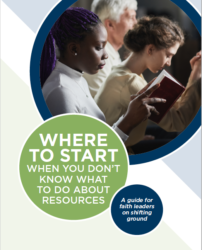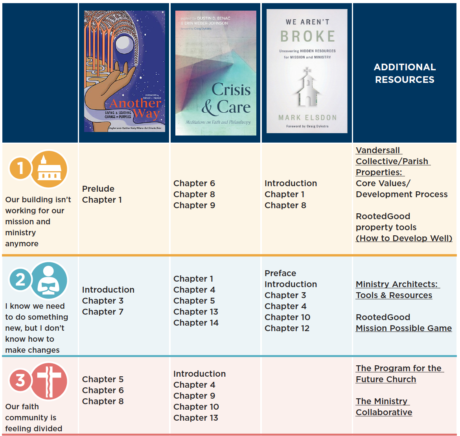Where to Start: A Guide for Faith Leaders on Shifting Ground (Insights)
Where to Start: A Guide for Faith Leaders on Shifting Ground (Insights)
by Dustin D. Benac, Mark Elsdon, and Erin Weber-Johnson
Across the American landscape, the relentless crises of the past few years have left many faith leaders feeling isolated without the necessary resources or tools. Some wonder if this is truly the ministry to which God called them.
Responding to this felt need, authors Dustin Benac, Mark Elsdon, and Erin Weber-Johnson have created a tool to help leaders of Christian congregations address nine different crises of the moment. In the spirit of collaboration and learning from each other, each author represents a different institution and is working in different vocations across the landscape of the church. As scholars, pastors, and practitioners, the authors, in partnership with Lake Institute’s Shifting Ground initiative, have sought to provide care and support to faith leaders and the church they love.
We are pleased to release Where to Start: A Guide for Faith Leaders on Shifting Ground as a free toolkit.
When a crisis hits, leaders can feel disoriented in ways that prevent them from taking the next step in mission and ministry. Imagining new possibilities often feels utterly impossible. This toolkit explores nine different crises and identifies a number of questions both faith leaders and their communities may now face. Where to Start also includes a key, connecting those questions to three new books and other resources that can help guide discernment and action. Without prescribing solutions to the complex challenges faith leaders face, these books and resources offer stories, illustrations, and conceptual frameworks that can stir new imagination for leaders and their communities.
The toolkit is structured to include both personal and organizational questions. Some of these questions invite reflection on one’s own leadership and vocations; others invite reflection on how to guide a broader community.
Likewise, the guide itself is designed so it can be used for different purposes. A single leader can work through the questions as a form of self-assessment. Recognizing that much in the past few years has required leaders to react and adapt in real time to a series of unknowns without pause for grief, celebration, or internal temperature-taking, this tool is designed to provide individuals both with prompts and space for reflection.
At the same time, the guide can be used in groups, either as a part of discussion within a congregation or with a cohort or group of religious leaders. Each series of questions can serve as discussion prompts which ultimately lead participants to a key grid where they can assess which resources might be helpful to them.
Here’s a snapshot of three crises and their corresponding key:
Some other sets of questions include:
- What do we do about congregations that have deferred maintenance, especially after our buildings haven’t been used during or since COVID hit?
- How can we innovate if we lack capacity (staff, volunteers, energy, time, etc.) to imagine a new future?
- How do we mend divides after polarization and political divisions?
- How do I continue to serve in contexts that no longer privilege my embodiment?
- How do I continue serving my faith community when it feels like too much is asked of me?
- What do I do when ministry isn’t worth the mounting personal costs?
- How do I live into my call when the community that called me may no longer exist?
- As we become more aware of how philanthropy has underinvested in organizations led by and for people of color (philanthropic redlining), what do we do when thinking about our own resources and gatekeeping?
- How can communities leverage access to funding networks to promote equity in funding?
While each question is complex, and it often feels like these crises come without end, this toolkit and the corresponding resources can help you move forward. Amid the bewildering experience of crisis, we know it can be difficult for leaders to determine the next step; for a broader community, this discernment process can also be painful and polarizing.
However, even when the crises are great and the next step is not clear, you don’t have to do this work alone. Even when leading amid uncertainty leaves us feeling lonely and isolated, we’ve each witnessed the possibilities that emerge through collaboration and partnership. We offer this toolkit as a reminder that you are not alone.
We really are better together.
The world needs your good and beautiful work right now; we need it now more than ever.
A multi-institutional collaboration with Lake Institute on Faith & Giving, The Program for the Future Church at Baylor University’s George W. Truett Theological Seminary, Vandersall Collective & RootedGood, this free tool is available here: Where to Start: A Guide for Faith Leaders on Shifting Ground.
Questions for Reflection
- Which questions highlighted in this article feel relevant to you and your organization’s context?
- What’s one thing you can do to start exploring these questions in the next week?
Expanded Perspective
 Where to Start
Where to Start
Where to Start is a collaborative project to support you — a faith leader who may not know what to do with your resources.
It’s been a hard time. Thanks for doing what you do. The world needs your good and beautiful work right now; we need it now more than ever.
The purpose for this tool is to walk with you as you consider some of the questions that are pressing on you and your ministry. As these questions are clarified, we can point you to some helpful resources for taking next steps.
2022 Lake Doctoral Dissertation Fellowship Recipient
 We are pleased to announce our 2022 Lake Dissertation Fellowship Recipient! Feyza Akova is a Ph.D. candidate in the Department of Sociology at the University of Notre Dame. Her dissertation project, “Journeys to Traditional Sufi Islam in America: Self-transcendence, Tradition, and Social Change in the Contemporary Modern World,” has been supported by the Center for the Study of Religion and Society and Institute for Scholarship in the Liberal Arts at the University of Notre Dame.
We are pleased to announce our 2022 Lake Dissertation Fellowship Recipient! Feyza Akova is a Ph.D. candidate in the Department of Sociology at the University of Notre Dame. Her dissertation project, “Journeys to Traditional Sufi Islam in America: Self-transcendence, Tradition, and Social Change in the Contemporary Modern World,” has been supported by the Center for the Study of Religion and Society and Institute for Scholarship in the Liberal Arts at the University of Notre Dame.
Planned Giving for Congregations
 This free webinar on September 20 will address estate planning in congregations. They will cover: Three actionable strategies you can use right now to encourage planned gifts to your congregation; why now is the time for your congregation to create a planned giving strategy if you want to take advantage of the Great Wealth Transfer; how planned giving in congregations differs from secular nonprofits; and, advice on how to start an estate planning ministry at your congregation and why designating a leader (or two) is crucial for success.
This free webinar on September 20 will address estate planning in congregations. They will cover: Three actionable strategies you can use right now to encourage planned gifts to your congregation; why now is the time for your congregation to create a planned giving strategy if you want to take advantage of the Great Wealth Transfer; how planned giving in congregations differs from secular nonprofits; and, advice on how to start an estate planning ministry at your congregation and why designating a leader (or two) is crucial for success.
Subscribe
Insights, a bi-weekly e-newsletter, is a resource for the religious community and fundraisers of faith-based organizations that provides:
- Reflections on important developments in the field of faith and giving
- Recommended books, studies and articles
- Upcoming Lake Institute events


